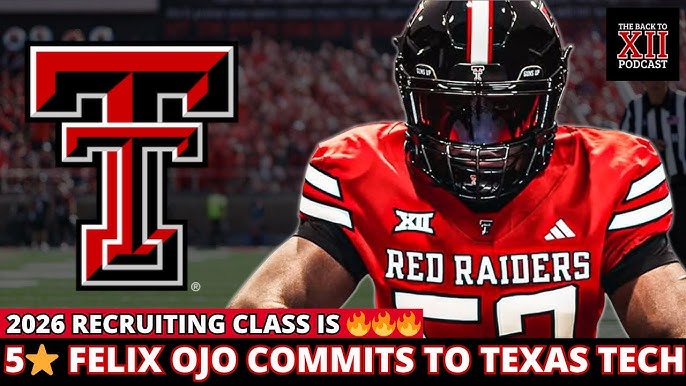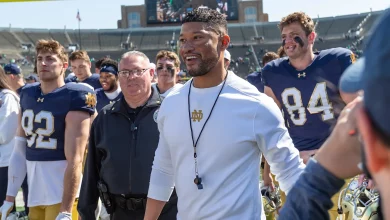Five-star offensive tackle Felix Ojo chooses Texas Tech over Ohio State, Texas, Florida, and Michigan, highlighting his top recruitment decision among elite college programs.

In the landscape of college football recruiting, few decisions resonate as prominently as that of a highly-rated, five-star offensive tackle choosing his program of allegiance. Recently, Felix Ojo, a top-tier offensive lineman rated as a five-star recruit, made a significant commitment to Texas Tech, turning heads by opting for the Red Raiders over traditional powerhouse programs such as Ohio State, Texas, Florida, and Michigan. His decision not only impacts the immediate trajectory of Texas Tech’s recruiting class but also signals broader shifts in recruiting dynamics, program competitiveness, and player development.
This detailed analysis examines the multiple facets of Ojo’s recruitment, the implications of his choice, and what it reveals about the current state of college football recruiting, especially within the offensive line position. We will explore Ojo’s background, the factors influencing his decision, the strengths of Texas Tech as a program, and how this commitment fits into the larger narrative of college football.
Background: Felix Ojo – The Prospect and His Rise
Felix Ojo, hailing from a high school with a reputation for producing elite talent, quickly established himself as one of the most sought-after offensive linemen in the nation. His physical attributes—standing over 6’6″ with a lean but powerful frame—combined with his exceptional footwork, agility, and technique, made him a five-star recruit in the eyes of major recruiting services like 247Sports, Rivals, and ESPN.
Ojo’s film showcases a player with rare versatility, capable of playing multiple positions on the offensive line, though he is primarily projected as a tackle. His ability to block in both pass protection and run blocking, along with his intelligence and leadership qualities, elevated his status among college recruiters.
Throughout his high school career, Ojo displayed consistent improvement, earning All-State honors and gaining recognition at national camps. He became a symbol of the future for programs seeking to bolster their offensive line corps with elite talent. His recruitment process was marked by heavy interest from multiple top programs, reflecting his elite status.
The Recruitment Process: A Battle Among Powerhouse Programs
Ojo’s recruitment was a high-stakes affair involving some of the most prestigious programs in college football:
- Ohio State: Known for producing NFL offensive linemen, Ohio State’s reputation in developing offensive tackles is unmatched. The Buckeyes’ offensive line coaching staff, led by experienced position coaches, made a strong push for Ojo, emphasizing their track record of NFL success and national championships.
- Texas: As a program with deep roots in producing offensive linemen and with a passionate fanbase, Texas aimed to secure Ojo to bolster its offensive line for its competitive ambitions in the Big 12 and national landscape.
- Florida: Florida’s consistent reputation for developing NFL talent and its proximity to Ojo’s home state made them a formidable contender. The Gators’ recent success and aggressive recruiting strategies kept them in the mix.
- Michigan: Michigan’s storied program and its focus on developing offensive linemen, coupled with a strong coaching staff, made them a serious competitor for Ojo’s commitment.
- Texas Tech: While historically not as dominant in recruiting as the others, Texas Tech’s recent developments, coaching staff, and offensive philosophy made them an attractive destination for offensive linemen seeking early playing time and a significant role in college football.
The recruitment campaign involved numerous visits, film evaluations, and ongoing communications. Ojo’s decision was ultimately shaped by a combination of factors, including the program’s fit, development opportunities, coaching staff, culture, and the vision each program presented.
Why Ojo Chose Texas Tech: Factors and Insights
Ojo’s commitment to Texas Tech surprised many analysts, given the program’s historical recruiting stature compared to the other blue-blood programs. Several factors influenced his decision:
1. Early Playing Opportunities
One of the most compelling reasons for Ojo’s choice was the promise of early playing time. Texas Tech’s offensive line depth chart and the coaching staff’s emphasis on developing young talent indicated that Ojo could see the field sooner than at other programs with more established veterans.
2. Offensive Philosophy and Fit
Texas Tech’s offensive scheme, often characterized by a fast-paced, pass-oriented attack under their coaching staff, aligns well with Ojo’s skill set. The team’s emphasis on protecting the quarterback and establishing a dynamic passing game suited his abilities as a technically refined tackle.
3. Coaching Staff and Development
Ojo reportedly connected well with Texas Tech’s offensive line coaches, who emphasized player development, personalized coaching, and a culture of accountability. His interactions with the staff highlighted their commitment to nurturing his talent and preparing him for the next level.
4. Academic and Personal Factors
Beyond football, academic offerings, campus environment, and proximity to family may have played roles in Ojo’s decision. Texas Tech’s reputation for academic support and a welcoming campus environment could have contributed to his comfort level.
5. Program Trajectory and Culture
While Texas Tech may not have the same national prestige as Ohio State, Michigan, or Florida, the program’s recent improvements, competitive ambitions, and innovative offensive strategies offered a compelling vision for Ojo’s future.
6. Recruitment Experience and Personal Connection
Personal relationships built during the recruiting process often tip the scales. Ojo’s rapport with the coaching staff, current players, and the overall vibe of the program might have resonated more strongly than other options.
The Significance of Ojo’s Commitment
Ojo’s decision to commit to Texas Tech carries multiple layers of significance, not only for the program but also within the broader context of college football recruiting.
1. Breaking Traditional Power Dynamics
Historically, elite recruits gravitated toward programs with established national success and NFL pipelines—Ohio State, Michigan, Florida, Alabama, Georgia, etc. Ojo’s choice to join Texas Tech challenges this norm, highlighting the increasing importance of fit, development opportunities, and early playing time over traditional prestige.
2. A Boost for Texas Tech’s Recruiting Profile
Landing a five-star prospect elevates Texas Tech’s national recruiting profile. It demonstrates that the program can attract top-tier talent, potentially opening doors for future elite recruits. This commitment signals a shift in perception—that Texas Tech is a viable destination for players seeking to maximize their development and exposure.
3. Impact on the Offensive Line Landscape
Ojo’s arrival adds immediate talent to Texas Tech’s offensive line, which could translate into improved performance on the field. His development might also influence other recruits to consider Texas Tech as a serious contender for top offensive linemen.
4. Implications for Powerhouse Programs
The decision highlights the evolving priorities of elite recruits. Programs like Ohio State, Michigan, and Florida may need to adapt their recruiting strategies to emphasize early opportunity and fit more heavily, even for five-star prospects.
5. Reinforcement of Player Agency
Ojo’s choice underscores the importance of player agency in modern recruiting. Recruits are increasingly making decisions based on holistic factors—culture, development, education—rather than solely on brand prestige.
Broader Trends in College Football Recruiting
Ojo’s commitment is emblematic of a few emerging trends:
- Player-Centered Decision Making: Recruits prioritize their individual development, early playing time, and fit over traditional program reputation.
- Rise of Mid-Major Powerhouses: Schools outside the traditional power conferences are increasingly able to attract elite talent by offering personalized development paths and immediate opportunities.
- Changing Perceptions of Program Prestige: While traditional blue-blood programs remain dominant, their grip is loosening as recruits explore less conventional options.
- Emphasis on Development and Coaching: Elite prospects are valuing coaching staff quality and player development plans more than ever.
- National Recruitment Complexity: The recruitment landscape has become more competitive, with programs across conferences vying for top talent, often emphasizing different selling points.
What’s Next for Texas Tech and Ojo?
Ojo’s commitment marks the beginning of a new chapter for Texas Tech’s football program. It will be interesting to observe:
- His Impact on the Field: As an immediate contributor, Ojo could help transform Texas Tech’s offensive line, improving both run blocking and pass protection.
- Recruiting Momentum: Ojo’s commitment may attract other highly-rated recruits, especially offensive linemen, to consider Texas Tech.
- Player Development and Team Success: With the right coaching, Ojo’s potential can be maximized, possibly elevating Texas Tech’s competitiveness in the Big 12 and nationally.
- Program Perception: The commitment could shift perceptions, positioning Texas Tech as a program capable of competing for top-tier talent, even against traditional powerhouses.
A Pivotal Recruitment Decision
Felix Ojo’s decision to commit to Texas Tech over Ohio State, Texas, Florida, and Michigan exemplifies the shifting dynamics of college football recruiting. It underscores the importance of fit, development opportunities, and early playing time over traditional prestige and brand names.
His choice sends a message to recruiting circles: top-tier talent is increasingly looking beyond conventional programs to maximize their growth and exposure. For Texas Tech, securing a five-star offensive tackle is a major coup that could catalyze a new era of competitiveness and recruiting prowess.
As college football continues to evolve, Ojo’s commitment serves as a case study in the changing priorities of elite recruits and the importance of strategic program positioning. It highlights that in today’s game, the best players are choosing programs that align with their personal goals, development plans, and future aspirations—regardless of historical stature.
This decision will undoubtedly be analyzed and debated for years to come, but its ultimate significance lies in the broader narrative of college football’s competitive and recruiting landscape—a landscape where opportunities, fit, and player agency are now at the forefront.









